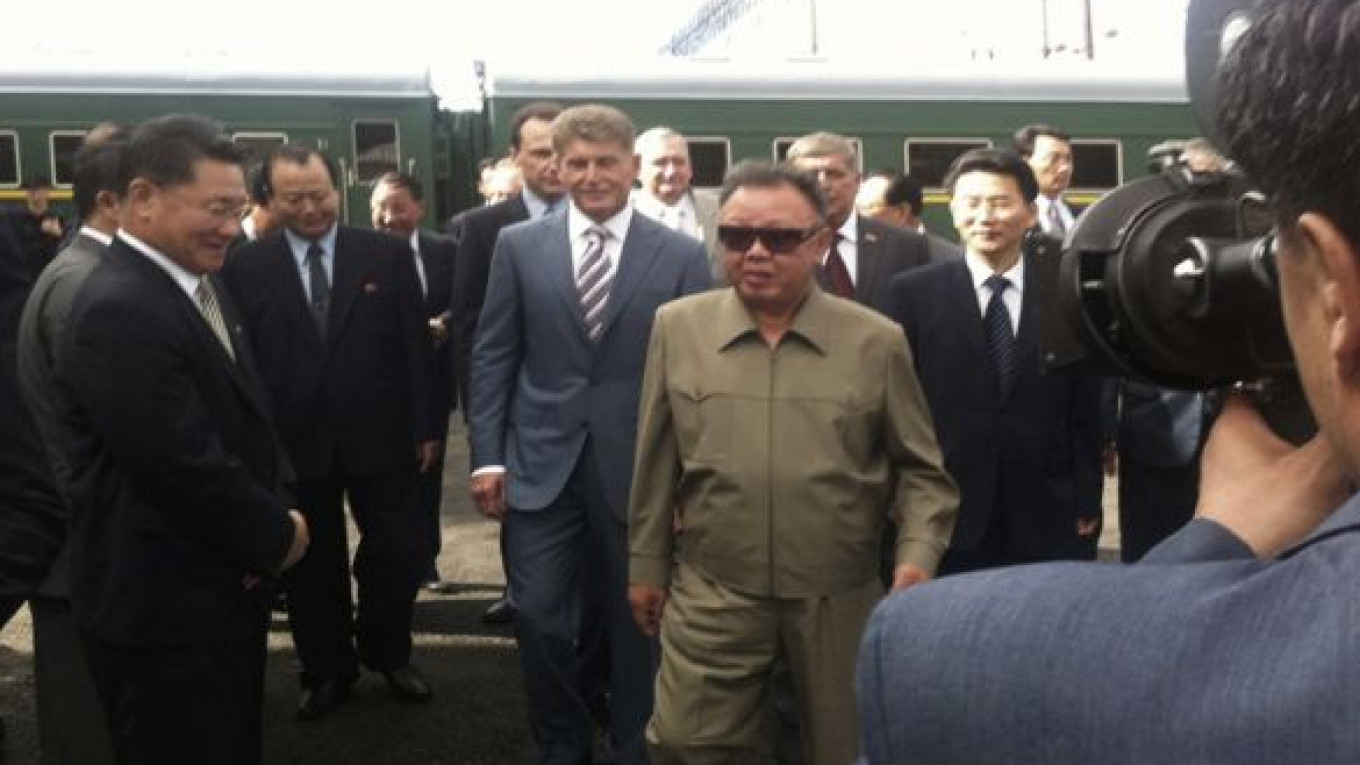North Korean leader Kim Jong Il has arrived in Ulan-Ude, where he is expected to meet President Dmitry Medvedev for a summit on Wednesday. Here are some questions and answers about Kim's visit, his first trip to Russia in nine years:
Q: Why visit Russia so soon after traveling to China?
A: Kim's Russia trip comes less than three months after he traveled to China, which was his third trip there in a year, capping his busiest schedule of foreign travel in his 17 years of power.
The North owes its political survival to both countries. For decades Moscow was its main ally, providing military and economic support before the collapse of the Soviet Union in the early 1990s. Since then the North has realigned its foreign policy toward China.
This latest trip could be an attempt to balance China's influence by forging closer ties with Russia.
The North's pursuit of nuclear weapons, and hostilities between the two Koreas in recent years, have raised concerns of a broader regional conflict. Kim's visits are seen as trying to assuage Beijing and Moscow, and to harmonize relations.
The aging Kim also wants to prepare the way for a smooth transition of power to his youngest son, Jong Un, for which he wants the backing of both China and Russia.
Q: Will six-party nuclear talks be on the agenda?
A: Yes. Both Moscow and Beijing back the immediate resumption of the aid-for-disarmament talks that collapsed two years ago.
Pyongyang will be looking to Russia and China to exert pressure on South Korea, the United States and Japan to restart the process as soon as possible.
Seoul, Washington and Tokyo say they are willing to resume talks where they left off, but insist that Pyongyang must show it is serious about nuclear disarmament. For a start, they say, the North must allow foreign nuclear inspectors back into the country.
Q: Will aid be on the agenda?
A: Yes. International sanctions for testing nuclear devices and missiles are hurting the impoverished North, which relies on foreign aid to keep its moribund economy afloat.
Severe weather has exacerbated food shortages, prompting the North to plead for international aid. Both Beijing and Moscow have answered Pyongyang's pleas for food aid.
The destitute North is also desperate for economic aid. Power shortages mean it struggles to run its factories, and much of its Soviet-era machinery and farm equipment is unusable. It could be seeking energy aid, as well as trying to boost transportation links.
The North has embarked on a new 10-year economic plan to improve infrastructure. It is looking for foreign investment, primarily from Beijing and Moscow, to support projects within special economic zones.
Q: What about a gas pipeline through North Korea?
A: A pipeline to supply natural gas from the Russian Far East to South Korea, via North Korea, has been talked about for years. In 2008, Gazprom signed a memorandum of understanding with the South's state-run Korea Gas Corp. to construct the pipeline.
Construction and maintenance costs would be huge. Building costs alone are estimated at $1.66 million per kilometer.
Experts say there is little chance the project will proceed anytime soon, given the two Koreas are still technically at war. They have only signed a truce, not a peace treaty, to end the 1950-53 Korean War. Last year's hostilities, in which 50 South Koreans were killed, underline that the time is not right.
Experts also say it is highly unlikely that the South would ever agree to a such a project as it would merely become another means for the North to hold the South hostage to its demands.
A Message from The Moscow Times:
Dear readers,
We are facing unprecedented challenges. Russia's Prosecutor General's Office has designated The Moscow Times as an "undesirable" organization, criminalizing our work and putting our staff at risk of prosecution. This follows our earlier unjust labeling as a "foreign agent."
These actions are direct attempts to silence independent journalism in Russia. The authorities claim our work "discredits the decisions of the Russian leadership." We see things differently: we strive to provide accurate, unbiased reporting on Russia.
We, the journalists of The Moscow Times, refuse to be silenced. But to continue our work, we need your help.
Your support, no matter how small, makes a world of difference. If you can, please support us monthly starting from just $2. It's quick to set up, and every contribution makes a significant impact.
By supporting The Moscow Times, you're defending open, independent journalism in the face of repression. Thank you for standing with us.
Remind me later.






